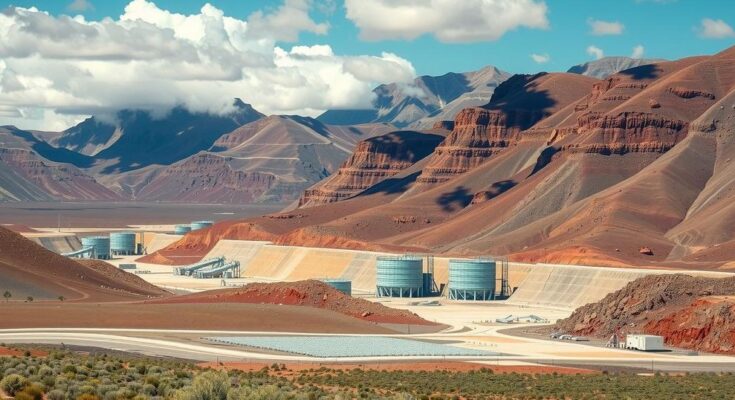Bolivia’s contracts with China and Russia to exploit lithium reserves face public backlash, leading to parliamentary discussions being halted. Concerns regarding transparency, economic benefits, and environmental impact have been raised. The agreements could delay large-scale production for over a decade, while Bolivia struggles to develop its lithium industry amid political and environmental challenges.
Bolivia is currently experiencing significant public opposition regarding contracts established with Chinese and Russian firms for the exploitation of the nation’s extensive lithium reserves. Community organizations assert that these contracts fail to deliver tangible benefits for local populations. In response to these concerns, the Bolivian Chamber of Deputies has suspended discussions on the agreements, awaiting comprehensive communication with civil society groups.
The contracts in question, which amount to approximately $2 billion, include one worth $970 million with Russia’s Uranium One Group and another valued at $1 billion with Chinese companies CBC and Citic Guoan Group. These contracts plan to establish lithium processing facilities capable of producing substantial quantities of lithium annually.
President Luis Arce has asserted that lawmakers are intentionally hindering these investments as part of a broader political agenda against his government. He has expressed that failing to approve these contracts within the year could postpone Bolivia’s lithium production by as long as a decade, warning that lithium may become obsolete as alternative clean energy sources emerge.
Omar Alarcón, head of the state-owned Yacimientos de Litio Bolivianos, supports these concerns, predicting that a lack of contract approval could impede large-scale production for up to 15 years. Even if the contracts are validated this year, expert Sergio Hinojosa indicates that substantial production may not commence until 2031.
Various civil society organizations and environmental groups, particularly from the Potosí region where the Uyuni salt flat is located, have raised alarms. They criticize the deals for their lack of transparency and potential environmental risks. Notably, there are significant discrepancies between the agreements, with the cost per tonne of lithium production being notably higher in the Russian deal compared to the Chinese one, raising questions about economic viability.
Concerns also arise regarding the tight timeline of 18 months for Uranium One Group to establish a facility before the contract lapsed, suggesting Bolivia might be burdened with unfinished projects. Public consultations are ongoing under Bolivian law, which requires thorough community engagement and environmental assessments before moving forward.
Despite possessing vast lithium reserves, Bolivia has faced challenges over the years in creating a successful lithium industry due to political upheaval and complications relating to resource extraction. Unlike neighboring nations like Chile and Argentina, Bolivia’s lithium resources remain largely underutilized.
The YLB has inaugurated Bolivia’s first industrial-scale lithium facility, but it operated at only 17% capacity last year, with projections of only reaching 23% by 2025. Government officials maintain that contract terms can be adjusted and continue to engage in discussions to alleviate public concerns, emphasizing the importance of these partnerships in fostering the lithium industry while retaining a majority share of profits.
The current situation surrounding Bolivia’s lithium contracts illustrates a complex interplay of political challenges, public discontent, and economic aspirations. While the government seeks to develop the nation’s lithium industry through partnerships with foreign entities, significant concerns have emerged regarding the transparency and feasibility of these deals. The outcome of public consultations and legislative discussions will be crucial in determining the future of Bolivia’s lithium production and its potential contributions to the global market.
Original Source: www.mining.com




